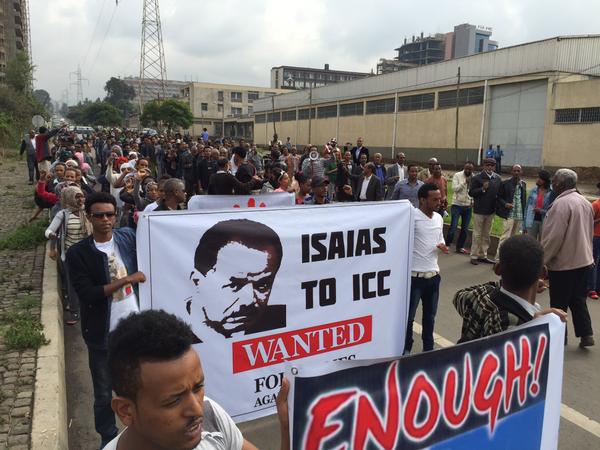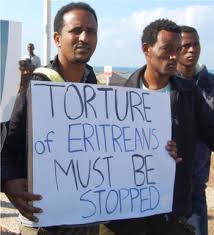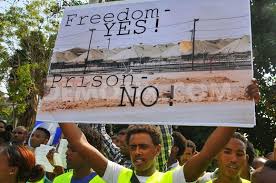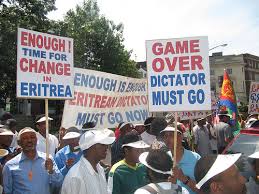NEWS ANALYSIS
Saba Makeda
Somewhere inside Eritrea, June 29th 2015
During the month of June 2015 the Commission of Inquiry (Commission) on Human Rights in Eritrea released its report: Report of the detailed findings of the Commission of Inquiry on Human Rights in Eritrea. The 453 page long report (not including the annexes) clearly describes the historical context of Eritrea, the Eritrean institutional/domestic legal framework, as well as the current status of human rights in Eritrea
The Eritrean Government reaction to the report, predictably has been one of declaring itself and the people of Eritrea as the victims of some global, fiendish plot against Eritrean people and the Eritrean Government. In a recent interview with the Chinese Television, CCTV news , the Eritrean Ambassador to Kenya, Mr Beyene Russom, states that he is Shocked! Bewildered! Stunned!, and finally Confused!. Because the report is very sickening and disgusting, virulent and outrageous in content.
[embedplusvideo height=”361″ width=”590″ editlink=”http://bit.ly/1GFjEDd” standard=”http://www.youtube.com/v/N5nvJfJJ4-Y?fs=1&vq=hd720″ vars=”ytid=N5nvJfJJ4-Y&width=590&height=361&start=&stop=&rs=w&hd=1&autoplay=0&react=1&chapters=¬es=” id=”ep9317″ /]
Ambassador Beyene Russom further states: “We believe that the promotion of human rights is a process, it should not be confrontational as it has been depicted. This is an unwarranted attack against our social fabric our government “The Ambassador omits to mention that the Commission had attempted to engage with the Eritrean Government and particularly had requested to travel to Eritrea and that in fact the Eritrean Government failed to engage or to respond.
The Eritrean Government is holding on to its siege mentality not only against the Commission’s report but also against the concerns and issues that are being expressed by young Eritreans, it is continuing with the approach that “they know it all” “it is my way or the high way” and that if we the Eritrean people are not in line with that then we are “defeatists and traitors”; or worse we have sold our soul to the twin devils “Ethiopia“, “USA”.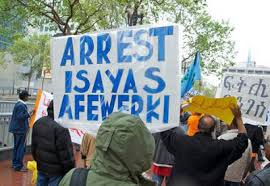
We are continuing with the narrative of Eritrea as victim of USA and other parties’ nefarious agenda in the Horn and at the same time we are not able to have any dialogue amongst ourselves about the Eritrean Government own CIA like involvement, in our name, in Darfur, Somalia, Sudan, South Sudan, Ethiopia, Democratic Republic of Congo, just to name the best known. I guess it takes a thief to know a thief.
Since the report has been published both the Eritrean Government and Eritrean Human Right Organisations have organised demonstrations either against the Commission report or in support. On the 22 June 2015 the Eritrean Government organised a demonstration against the Human Right report in Geneva. A well-attended and colourful flag waving demonstration.
The Eritrean Human Rights demonstration happened in Geneva on 26 June 2015 also well attended and by Eritreans in the Diaspora clearly giving a signal to Eritreans back home that their suffering is known to the people in the Diaspora.
The Eritrean Government, in continuing to attempt to discredit: the Eritreans who are telling of their experiences – discrediting their stories rather than taking action to ensure that such things do not continue to happen; the Eritrean Human Right organisations, as well as the Eritrean opposition (such as it is ) .
It is ironic that the very Government that is denying Eritreans so many rights, including the right to speak, in Eritrea and many cases threatens Eritreans in host countries, has no problem availing itself of those rights in third countries to deny the Eritreans the rights to their own stories and experiences
As we engage on the human right issues in Eritrea and the situation of our country in general it is important to understand that Commission’s Report is assessing Eritrea against international human right obligations that the Eritrean Government has freely entered into. In other words the standard being applied is not some kind of plot against Eritrea but a standard that the Eritrean Government has agreed to.
The Eritrean Government clearly wants the Ethiopian Government to be held accountable for its international agreements (i.e. the Algiers Agreement) however it is not prepared to be held accountable for the application of the Human right law and the protection of the rights of its own people.
Specifically the Eritrean Government has adhered to the following universal and regional human right treaties:
- The Convention on the Rights of the Child since 1994 – and its two Optional Protocols since 2005,
- The Convention on the Elimination of All Forms of Discrimination against Women since 1995,
- The African Charter on Human and Peoples’ Rights since 1999,
- The African Charter on the Rights and Welfare of the Child since 2000,
- The International Convention on the Elimination of Racial Discrimination since 2001,
- The International Covenant on Economic, Social and Cultural Rights since 2001,
- The International Covenant on Civil and Political Rights since 2002,
- The Convention against Torture and other Cruel, Inhuman or Degrading Treatment or Punishment since September 2014.
Under the abovementioned human right treaties, the Eritrean Government has the obligation to protect the human rights of the Eritrean people by enacting and enforcing national laws that protect human right. This is not happening and the justification that we are being given is that the country is in state of emergency because of the unresolved border issue with Ethiopia.
The Human Right conventions do provide for derogations under exceptional circumstances. However such derogations cannot be discriminatory and are regulated by the Human Right treaties themselves
The International Convention on Civil and Political rights – Art 4 requires Governments to give notice to the UN of circumstances arising that may require a derogation of certain rights. Article 4 further states that the following rights are non- derogable and must be respected at all times including during emergencies such as the one claimed by the Government of Eritrea:
a) Right to life ( shoot to kill policy that despite the assertions to the contrary is still applied)
b) The prohibition against torture or cruel and inhuman degrading punishment (i.e. being jailed for life and having no access to family, the beatings, tying people in a figure 8 or helicopter position, overcrowding and poor sanitation, solitary confinement for extended period etc. );
c) Prohibition of slavery and forced labour ( Warasy Ykalo is a programme that has nationalised Human Resources and is akin to forced labour )
d) Freedom of thought, conscience and religion (the arrest of journalist, Jehovah witness and other religious groups. The detention of Abune Antonios the head of the Orthodox Church first under house arrest, 2006 to 2007 and now incommunicado
To date the Eritrean Government has not given any notice to the UN of circumstances arising that require the derogation of the rights of Eritreans. In fact in Eritrea there has never been a curfew nor has there been a formal declaration of a state of emergency.
What we do have and continue to have is an Eritrean Government, describing Eritreans telling their stories and voicing their concerns as traitors and generally treating all Eritreans and especially dissenters in a contemptuous manner.
The People Front of Democracy and Justice (PFDJ) has forgotten that all Eritreans love Eritrea and that the land of Eritrea is in our blood and that we have imbibed the essence of this land through our mothers milk, our water, our tea, and our coffee and that this love and connection to the land is higher in the order of things than any connection to the People Front of Democratic Justice (PFDJ). This connection and prioritisation was clearly demonstrated during the war with Ethiopia in 2000, when the young conscripts, the same people that are now protesting and are becoming refugees, disobeyed orders to abandon their posts and held the line in the battle for Assab.
The current contest between us the new generation of Eritreans and the Eritrean Government, is not a denial of our heritage as Eritreans, nor is it a denial of the accomplishments of the generations that have come before us, it is in fact an affirmation of that heritage and our commitment, as Eritreans, to fight against injustice and tyranny, even when that injustice and tyranny is perpetuated by one of our own. Our call is not Victory to the Masses! – for the Eritrean People are not an amorphous entity they are a deliberate coming together of many Peoples. Our call is Victory to the Eritrean People!
In 2001 we, the people of Eritrea wanted to know:
- How and why Eritrea/Ethiopia war that killed over 100,000 Eritreans was started. In particular given the troubled history between the Eritrean liberation movement and the Tigray People Liberation Front in Bademe – how is it that we failed to prevent Bademe becoming such an issue. Also how is it that we failed to exercise the proper level of Government control of Alietena and parts of Tsorona so that in fact the Eritrean people have lost territory
- What happened to our troops in Bademe in 1999?
- How was it that our troops were not as well prepared as we thought?
- Who was responsible for the war strategy in 2000? Who gave the order to dismantle Assab and to retreat from the Assab front?
- why we did not accept in Feb/March 2001 the peace agreement that we accepted in June 2001–possibly sparing the loss of so many lives on both sides
- How has the current policy of refusing to talk to Ethiopia actually helped Eritrea?
In 2015, we the Eritrean people want:
- To know where are the political prisoners
- To know why are our children tortured
- To Know why are our children being used as slave labour
- The Government to account for the hard line policy that has been applied in Eritrea, for more than a decade, and that has resulted in the isolation of Eritrea is isolated both regionally as well as globally
- To know what the Eritrean Government is doing with the money from the mining industry – noting that when the former and much feared Minister of Finance and Development: Mr. Berhane Habtemariam asked the same question he was frozen meaning that he is not allowed to work or leave the country. The human right implications of being frozen are clearly described by the Commission in the current report
To date not only there are no answers to the questions raised above, there is also no space or possibility of engaging in any meaningful way with the Eritrean Government on the issues. We the Eritrean people, in our own country, are not able to question or engage the Eritrean Government at any level on how the country is being managed and in particular on how our relationship with Ethiopia is being managed.
The group of ministers (G15) that tried to do so were arrested in 2001 and have disappeared as have so many after them. As it is not possible to have our voices heard in Eritrea, without being condemned as traitors or worse defeatist we must raise our issues wherever we are – in this also we are following a long tradition.
What we do have is a highly militarised Dergue like dictatorial regime justified on the basis of the continuing “No war; No Peace situation in the country”. After more than thirteen years of the current highly militarised hard line policy toward Ethiopia it must be clear that it is not working and that it is not getting us what we want – Ethiopia out of Bademe, normalisation of relationships, including trade, with Ethiopia.
According to Albert Einstein insanity is “when we keep doing the same thing over and over again and we expect different results”. The continuation of the current Eritrean militarised hard line policy not only with Ethiopia but also with its own People fits this definition of insanity. It is time to change.
Makeda Saba
makedasaba@ymail.com

